Antitrust and Unfair Competition Law
ANTITRUST & UNFAIR COMPETITION LAW INSTITUTE: A VIEW FROM THE FLOOR
January 12, 2023[1]
OPENING REMARKS BY TOM DAHDOUH
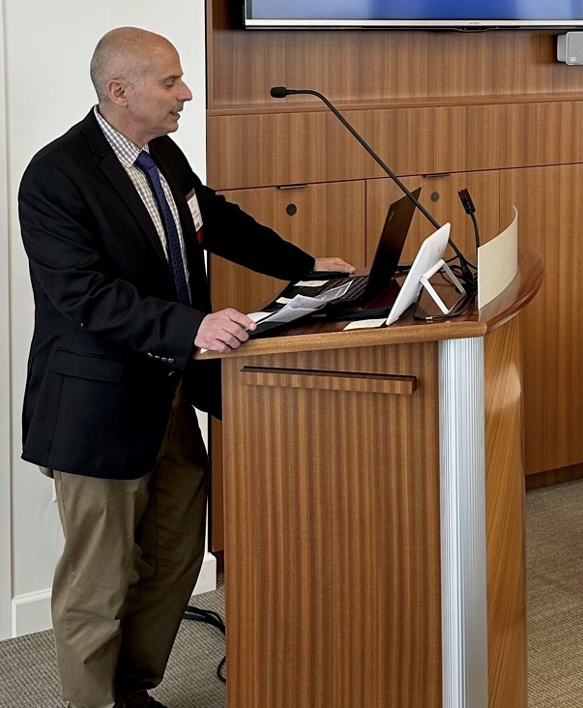
Mr. Dahdouh has over 31 years of experience at the FTC and continues as an Advisor to the Section to this day. Mr. Dahdouh discussed the FTC’s November 2022 updated “Policy Statement Regarding the Scope of Unfair Methods of Competition under Section 5 of the Federal Trade Commission Act.”[2] He reviewed the 2015 Policy Statement and the background leading to the “back to basics” November 2022 update. Mr. Dahdouh briefly focused on the basic principles to be considered: the method of competition (the conduct); must negatively impact conditions (focus on the incipiency), and the cognizable justifications.
PANEL 1: MEET THE UCL AND FTC ACT ENFORCERS
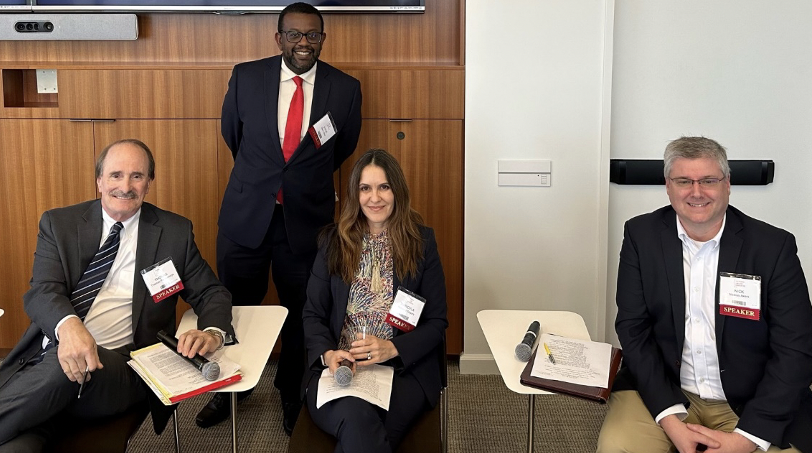
This incredible panel of enforcers reviewed numerous decisions obtained by the FTC, the California Attorney General and county and city authorities (either separately or in coordination with each other) of successfully prosecuting various unfair competition laws. Details of these decisions were provided in the written materials.
Mr. PAPPAGEORGE
Mr. Pappageorge focused on the “way we do what we do” by reviewing the practices and priorities among the various enforcement agencies. The UCL and the Cartwright Act provide standing to the California attorney general, district attorneys, and specified city attorneys and county counsel to bring actions on their own for injunctive relief and civil penalties. He highlighted the coordination and cooperation among prosecutors and described the various means of coordination. Mr. Pappageorge highlighted several recent enforcement actions which demonstrate how the FTC, state and local government agencies, work cooperatively to enforce unfair competition law in California. One example was County of San Diego v. Match Group, Inc. which resulted in $2 million in civil penalties and costs, in addition to victim restitution, from the operator of numerous online dating sites for violation of California’s automatic-renewal and dating service contract laws.
Mr. AKERS:
Mr. Akers described the AG’s office as the country’s “oldest law firm” with practice areas including consumer protection, privacy, and UCL. For example, the “unlawful” prong of the UCL covers: all housing relating issues: fire arms (such as ghost guns); lending and debt collection (such as rent to own); and for profit education (reviewing the Corinthian College case providing $5.8 billion in debt relief). Mr. Akers highlighted a coordinated effort among various agencies (including the Naval Investigative Services) in FTC v. Harris Originals of NY, Inc.(“Harris”), E.D.N.Y. Case No. 22-cv-4260 (July 20, 2022) to get injunctive relief and full refunds for consumers. Harris targeted active duty service members at retail stores across the country with a false and misleading installment contract financing scheme. Mr. Akers noted that many things are “purple” in the consumer protection area.
Ms. SEGUARA:
Ms. Segura highlighted the very broad mission of the FTC with eight regional offices including the consumer protection office in LA. She then mentioned “big changes” at the FTC describing AMG Capital Mgmt., LLC v. FTC, 141 S. Ct. 1341, 1347-48 (2021) (“AMG”) as a “sea change.” In AMG, the United States Supreme Court ruled that the FTC did not have the authority to seek equitable monetary relief under Section 13(b) of the FTC Act. The FTC continues to do its enforcement work but in different ways which includes restitution, disgorgement, and civil penalties in some circumstances. For example, the FTC provides notice that certain acts or practices are presumptively deceptive or unfair (bamboo products not made of bamboo). If the subject of the notice continues the practice in violation of the notice, then civil penalties may be imposed. Ms. Segura concluded with comments on “dark pattern cases” and discussed the FTC’s agreement with Epic Games to pay over $500 million in relief (part monetary penalty and part refund to consumers) over allegations that the company violated COPPA.
Submitted by Editors
PANEL 2: EMERGING UCL ISSUES
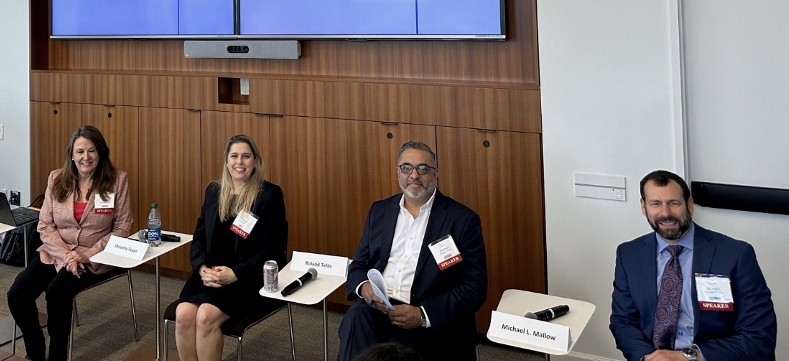
The panel knocked this one out of the park, sparking a discussion Unfair Competition Law (“UCL”) practitioners will remember. Many attendees mentioned the need to brush up on Sonner and Guzman afterward. The panel discussed cutting-edge topics, providing a unique view into how government enforcers combatted fraud using the UCL during the COVID-19 pandemic.
ROLAND TELLIS:
Roland Tellis raised interesting issues with the application of the UCL outside the antitrust context, stating, “if an unfair claim was limited to antitrust violations, we wouldn’t have the UCL.” Mr. Tellis discussed the UCL’s “unfair” prong, at issue in Epic v. Apple, Case No. 4:20-cv-5640, Northern District of California (“Epic”), currently pending appeal in the 9th Circuit. Mr. Tellis commented that the bulk of litigation occurs around the unlawful or fraudulent standard, not the unfair prong. The problem is there are two or three tests out there to apply, (1) balancing; (2) tethering; and (3) FTC section 5. The appeal in Epic may yield a more uniform standard. In Epic, the trial court found the conduct did not violate federal and state antitrust laws, but was unfair. The California Attorney General (“AG”) submitted an amicus brief to assist the Circuit regarding the proper scope of the UCL’s “unfair” prong. The AG noted modern UCL law is much broader. The California Supreme Court has interpreted the law and the unfair prong broadly, the AG urges the Ninth Circuit to do the same.
CHRISTINA TUSAN:
Christina Tusan led a discussion of developments in litigation brought by governmental agencies. Ms. Tusan noted the general increase in cooperation among enforcement agencies, and interagency efforts. Ms. Tusan highlighted recent victories, partnering with the Consumer Financial Protection Bureau, AG and others on issues regarding the lending and collection market for student loans, disbursing the over $95M ($7M California) penalty to those impacted. Government enforcers also used the UCL toolkit during the COVID era, to fight fraud in the COVID test kit market. These efforts gained compliance from defendants, in many cases shutting down the operations entirely. The LA City Attorney similarly fought against fake COVID “cures.” These efforts demonstrate the successful application of California’s UCL law on a new area that did not exist previously.
MICHAEL MALLOW: Michael Mallow discussed recent challenges to UCL claims. Mr. Mallow noted, given the Sonner I & II[3] Guzman [4] decisions, we may not see as many UCL cases filed in Federal Court. In Mr. Mallow’s view, as a counselor and a litigator, “It’s a problem is to have a law that is amorphous. Businesses need to know where the lines are, so they can know when they are getting close and avoid crossing them.”. Mr. Mallow took the position that Sonner and Guzman indicate that even if there are alternative theories, Sonner still applies (i.e. an inadequate remedy at law is required to tap into the courts equitable powers). Mr. Mallow views a complaint containing a UCL claim and CLRA claim for damages, as an inconsistent pleading. Roland Tellis pointed out that it is not clear that Sonner applies to all forms of equitable relief, an injunction added to the relief sought will avoid dismissal at the Rule 12(b) stage.
PANEL DISCUSSION:
The panel also discussed the rise of UCL claims in data privacy cases alleging violations of the California Consumer Privacy Act (“CCPA”). Cal. Civ. Code § 1798.100 et seq. This law is often referred to as the “Cookies Law” and caused all websites to have a prompt for the user to allow tracking. The CCPA is a disclosure statute, so parties have been bringing UCL claims for violations of the CCPA. Roland Tellis commented “this shows application of the UCL is cutting edge, in an era where users are being tracked across all platforms.” When brought under the unfairness prong, the CCPA has an “anti-borrowing” provision. See Cal. Civ. Code § 1798.150(c). Courts are assessing, and in some instances rejecting, defenses to UCL based on the CCPA. Compare Mehta v. Robinhood Fin. LLC, No. 21-cv-01013-SVK, 2021 U.S. Dist. LEXIS 253782, at *23-25 (N.D. Cal. May 6, 2021); Silver v. Stripe Inc., No. 4:20-cv-08196-YGR, 2021 U.S. Dist. LEXIS 141090, at *19-20 (N.D. Cal. July 28, 2021).
The panel also briefly discussed arbitration clauses and public injunctive relief. The U.S. Supreme Court’s Viking River Cruise decision stated that a claim for public injunctive relief may not be compelled to private arbitration. (Viking River Cruises, Inc. v. Moriana (2022) 142 S. Ct. 1906) The divisibility of the claims as public versus private is now at issue. However, claims for public injunctive relief are typically read very narrowly. Mr. Mallow also noted a change in Cal. Civ. Code § 1281.9, where if defendant moves to compel arbitration and then misses a fee when due, on day 31 the plaintiff may move: (1) to have arbitration withdrawn; and (2) for fees incurred during the arbitration proceeding. He also cautioned this may occur with any missed incremental progress payments by the defendant as well.By Alex Tramontano is an associate attorney with the San Diego office of Wolf Haldenstein Adler Freeman & Herz LLP
PANEL 3: STRATEGIES AND PITFALLS IN UCL LITIGATION
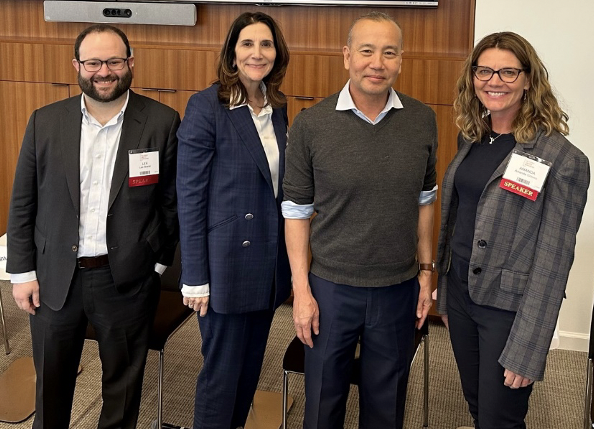
Lee Brand, Partner at Pillsbury Winthrop Shaw Pittman LLP, moderated an engaging panel with some of the top practitioners in the area of Unfair Competition Law (“UCL”) about strategies and pitfalls in UCL litigation. The panel included esteemed lawyers representing government enforcement, defense counsel, and private consumer protection enforcement.
TRACY HUGHES: Before commencing litigation, Tracy Hughes asks herself, “Is the conduct viscerally offensive? Does it really matter to the consumer?” While the conduct may be a technical violation, it might not rise to the level of an enforcement action. Ms. Hughes used the example of underweight bags of dry concrete mix, as opposed to materially underweight packages of baby formula – one, people use and care about every ounce (formula); whereas, the other might have the amount in question discarded as a regular waste byproduct.
HOON CHUN:
Hoon Chun, taking a humorous approach, looks for “easy low-hanging fruit.” As a prosecutor, he always asks, “(1) Tell me the rule they are violating or tell me how it’s misleading; and (2) Is it systemic or isolated?” If there is a clear rule or law violation and the action is systemic, Mr. Chun would be much more likely to move forward on the case. Mr. Chun has never experienced a successful removal against a governmental entity, but that is because the District Attorney’s Office deals in state law. Since systemic cases are rarely within the borders of Los Angeles County, Mr. Chun works with other government agencies. Collaboration of many agencies and prosecutors also gives the investigation or task force credibility.
Regarding coordination, Mr. Chun indicated the California District Attorneys Association (“CDAA”) has an agreement to avoid duplication of contact with defendants by prosecuting agencies. One office has the lead on each particular matter and forms teams. It avoids duplication of efforts and external battles over leadership within a prosecution task force. Instead, you register the new case and you are the lead. Members of other agencies will check the database and often reach out to offer help.
AMANDA GROVES:
Amanda Groves commented regarding early case administration and motion practice. In her practice, Defendants are better positioned in federal court. California’s state court procedural rules are very difficult for defendants (i.e. motion for summary judgment notice periods; demurrers are harder to get sustained; better federal scheduling processes; defense favorable federal standing principles under Article III). Regarding arbitration, it is getting more complicated. Ms. Groves usually will move to compel arbitration, however, there is some movement toward choosing not to enforce such provisions as a matter of practice. Ms. Groves’ warning to the attendees: “With mass arbitrations becoming a thing, you have to be careful what you wish for.”
PANEL DISCUSSION: PLEADING MOTIONS
In discussing pleading motions, Mr. Chun agreed, “When it’s a pure question of law it makes sense to file a demurrer; but factually, if the District Attorney’s office is filing – the case is low-hanging fruit.” Regarding challenges to class allegations, Amanda Groves, finds at the pleading stage most judges will deny any challenge to class action allegations, and even at the class certification stage, judges tend to deny the motion without prejudice and plaintiffs will try again.
PANEL DISCUSSION: DISCOVERY
Fact discovery is simple for Hoon Chun: “When I was in homicide my policy on discovery was this: ‘Here’s my file, except for the privileged stuff.’ I still do that, whether there’s a discovery request for it or not.” Amanda Groves commented that the defendants do not have that luxury. For a defendant with large amounts of data, discovery can be extremely onerous and take on a life of its own. It used to be you could bifurcate discovery. Strategically bifurcation can be a mistake because you cannot raise a defense to class certification if you have not produced the data. Defendants are often required to produce a lot of information before class certification. Mr. Chun added there are additional tools for government enforcers: the administrative subpoena. Gov. Code 11180 et seq. Mr. Chun prefers to issue an “invitation letter” to ask the business to meet and provide information cooperatively.
Shifting to expert discovery in UCL cases, Amanda Groves commented that defendants usually need an industry expert “to explain the disputed practice is not unfair, not unreasonable and often an industry-wide practice.” Defendants often need a damages expert or rebuttal expert. Sometimes a consumer survey expert is required; however, many judges are becoming skeptical of this type of evidence. Mr. Chun explained that the government does not usually use experts. On a misleading claim, the primary evidence is the advertisement. A jury does not need an expert or a survey to explain why it is misleading.
PANEL DISCUSSION: SETTLEMENT NEGOTIATIONS
The attendees also received a behind-the-curtains view of settlement negotiations. Mr. Chun estimates 99% cases are settled before the District Attorney files a case. Prosecutors are usually willing to start talking settlement when a defendant is prepared to fix the problem and comply. Prosecutors are under an obligation to give mitigation and cooperation credit. The terms of any settlement must “catch the attention of the decision-makers at the company.” Settlements with the District Attorney or any other CDAA prosecutor must be publicly filed. The CDAA manual indicates it is unethical for public prosecutors to settle a public enforcement action secretly. Amanda Groves has an open door policy to discussing settlement at any stage in the litigation, and in civil cases she recommends working with a reputable mediator to help ensure the settlement will receive judicial approval.
PANEL DISCUSSION: SUMMARY JUDGMENT/ADJUDICATION
The panelists shared their views of summary judgment, adjudication and trial. Amanda Groves shared that in representing a defendant, filing a motion for summary judgment would normally be worth doing. Pragmatically, class actions hardly ever go to trial. “The result could be astronomical to the company, so of course you should try an MSJ.” Ms. Groves imparted a tip to defense counsel regarding MSJ motions: “If you are entering into settlement discussions it’s good to have it hanging over everyone’s head.” Finally, when it comes to trial Ms. Groves shared a bench trial is always preferable to the defense.
Submitted By Rachele Byrd is an attorney and partner with the San Diego office of Wolf Haldenstein Adler Freeman & Herz LLP
PANEL 4: ETHICAL ISSUES FOR UCL LAWYERS IN THE COURTROOM
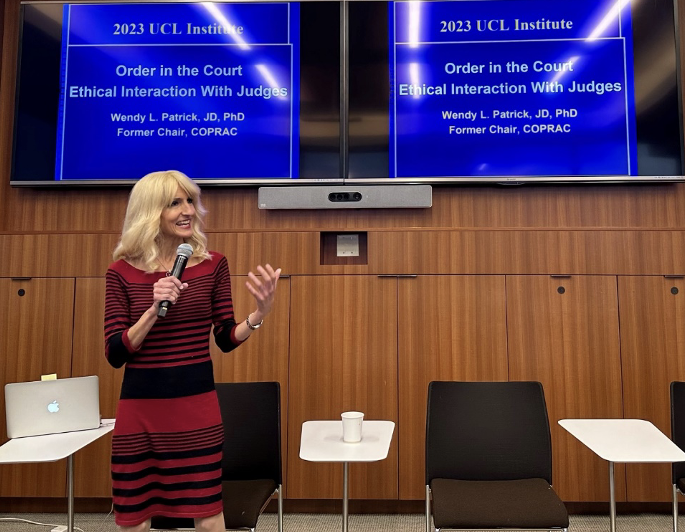
The Ethical Issues for UCL Lawyers in the Courtroom discussion was led by the esteemed Wendy L. Patrick of the San Diego County District Attorney’s Office. Ms. Patrick is a career prosecutor handling cases involving attorney misconduct, unauthorized practice of law, and official misconduct. Ms. Patrick is a past Chair of the California State Bar Ethics Committee (Committee on Professional Responsibility and Conduct), and past Chair of the San Diego County Bar Association’s (SDCBA) Legal Ethics Committee. She is also co-chair of the California District Attorneys Association Ethics Committee.
CURRENT RULES OF PROFESSIONAL CONDUCT
Ms. Patrick’s seminar was delightful and engaging. Referencing the 2018 update to California’s Rules of Professional Conduct, the discussion provided attorney practitioners with tools to navigate and understand the oft-blurred lines of ethics and civility. Throughout the panel, Ms. Patrick covered: (1) the inherent respect due to courts and judges; (2) the impartiality and decorum of the tribunal; (3) the baseline of not interfering with the functioning of the court (4) the judicial power to enforce civility: and (5) relationships between judges and attorneys including the appearance of bias.
CONFLATING ETHICS AND CIVILITY
Ms. Patrick stressed the continuing trend apparent in the legal field where ethics and civility are often conflated through case law with Judges often using ethical rules to denounce uncivil attorney behavior. A great resource for understanding ethics and civility, is Rule 1.0 of the Rules of Professional Conduct. Comment 4 of Rule 1.0 allows practitioners to cast a wide net, and pull from other jurisdictions where California lacks guidance on potentially unethical or uncivil behavior.
YIELDING TO RULINGS OF THE COURT
Ms. Patrick next turned to California Business and Professions Code section 6068 – a powerful courtroom statute. Section 6068(b) makes clear it is the duty of attorneys to maintain the respect due to the courts of justice and judicial officers. Through referencing quite uncivil behavior, Ms. Patrick emphasized the importance and necessity of yielding to the rulings of the court—whether right or wrong. In guiding an understanding of what is and is not civil, Ms. Patrick provided colorful and amusing examples of attorneys engaging in unacceptable behavior. The guidepost throughout: attorneys should not offend the public’s sense of the court’s inherent dignity. Illustratively, ABA Rule 3.5 supports the notion that a lawyer shall not engage in conduct intended to disrupt a tribunal.
JUDICIAL POWER TO ENFORCE CIVILITY
Turning to judicial power to enforce civility, Ms. Patrick highlighted California Code of Civil Procedure section 128 which allows the court to hold attorneys in contempt in order to preserve and enforce order in its immediate presence. Visual presentation of attorneys in court—both in attire and in body language—may be admonished and sanctioned by the court. Using historical examples of offensive odors and preposterous hats, Ms. Patrick identified a touchstone for attorneys: Do not interfere with the functioning of the court! Judges possess the power to hold attorneys in contempt for disruptive behavior such as eye rolling, dramatic sighing, and other expressions of displeasure.
RELATIONSHIPS WITH JUDICIAL OFFICERS
Ms. Patrick also focused on relationships with judicial officers and the standards of civility and ethics for judges. Ms. Patrick made clear the Code of Judicial Ethics does not specifically prohibit judicial officers from providing feedback on attorney performance or maintaining relationships with attorneys on social media. However, several canon restrictions and ethical risks must be considered. Judges are prohibited from engaging in ex parte communications and cannot create an appearance of favor or bias. Nonetheless, judges are presumed impartial and best-positioned to assess whether their impartiality might reasonably be questioned. Ms. Patrick emphasized attorneys should also avoid the appearance of bias by notifying opposing counsel or an unrepresented opposing party of any close relationship between the attorney and a judicial officer.
RESPONDING TO JUDICIAL MISCONDUCT
Ms. Patrick next focused on responding to judicial misconduct. As noted in Rule 1.0 of the Rules of Professional Conduct, attorneys are allowed to look to other jurisdictions for guidance. ABA Rule 3.5 deals with impartiality and decorum of the tribunal and can help attorneys understand how to address any unethical or uncivil behavior of a judge. Ms. Patrick next directed the conference to California Rule 8.2 to delineate the importance of maintaining respect for the judge and the court both in and outside of the courtroom. While attorneys are free to vent and complain, they must abide by California Rule 8.2, “[a] lawyer shall not make a statement of fact the lawyer knows to be false or with reckless disregard.”
DEFENDING THE INTEGRITY OF THE COURT
Lastly, Ms. Patrick underlined that while judges hold a great amount of power in the courtroom, they are bound by restrictions that prevent them from impacting public opinion. As such, attorneys are encouraged to continue traditional efforts to defend judges and the integrity of the courts when those institutions are unjustly criticized.
Submitted by Ferdeza Zekiri is an associate attorney in the San Diego office of Wolf Haldenstein Adler Freeman & Herz LLP
[1] All of the enforcer speakers provided the caveat that the opinions and comments provided during the presentations were their own personal opinions and not the opinions of the enforcement agencies for who they worked.
[2] Commission File No. P221202
[3] Sonner v Premier Nutrition Corp., 971 F.3d 834 (9th Cir. 2020) (Sonner I) – in a diversity case, claims for equitable restitution under the UCL are subject to dismissal where the plaintiff has an adequate remedy at law.
Sonner v Premier Nutrition Corp., 49 F.4th 1300, 1304 (9th Cir. 2022) (Sonner II) – dismissal of the plaintiff’s UCL claim based on an adequate legal remedy was not for “lack of subject matter jurisdiction.”
[4] Guzman v. Polaris Indus., 49 F.4th 1308, 1313 (9th Cir. 2022) – dismissal of UCL equitable restitution claim under Sonner I is a dismissal for “lack of equitable jurisdiction,” dismissal without prejudice to allow refiling in State Court.
